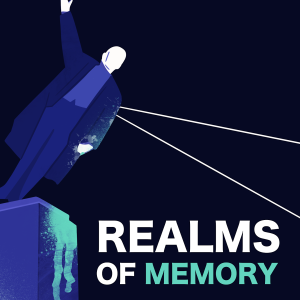Episodes

Tuesday Feb 04, 2025
Tuesday Feb 04, 2025
The 9/11 2001 attacks on America unleashed a surge of memorial work unmatched since the Civil War. New York City became a magnet for billions of dollars of spending on the construction of a memorial, museum, and high profile projects such as One World Trade Centre and the Oculus. What do these projects reveal about the nature, constraints, and abuses of 9/11 memory? To what extent have they helped or hindered American efforts to understand and to come to terms with the past? For more, listen to my conversation with New York University Professor Marita Sturken about her book Terrorism in American Memory: Memorials, Museums and Architecture in the Post 9/11 Era.

Tuesday Jan 21, 2025
Tuesday Jan 21, 2025
The attacks of September 11th 2001 challenged core beliefs about how Americans understand themselves, their relationship to others and their place in the world. How Americans responded to the attacks through their memorial work and the rebuilding of ground zero in New York City is the focus of Marita Sturken’s book Terrorism in American Memory: Memorials, Museums and Architecture in the Post 9/11 Era. A conversation with New York University Professor Marita Sturken, next on the February 4th episode of the Realms of Memory podcast.

Tuesday Jan 07, 2025
Tuesday Jan 07, 2025
In 1989 and 2004 something unusual happened in the town of Philadelphia in Neshoba County, Mississippi. After decades of silence whites finally joined their black neighbors in commemorating the 1964 murders of three young civil rights workers. What was different about 2004, however, was that the commemoration was just the beginning. The organizers forged an identity, as the Philadelphia Coalition, and went on to achieve several transformative goals. They helped bring justice to the Klan leader responsible for the murders, they helped make civil rights education mandatory across the state, and they helped establish a South African-style Truth and Reconciliation Commission to look at racially motivated crimes in the state’s past. How commemorations can become something larger, something transformative, is the focus of Furman University sociologist Claire Whitlinger’s book, Between Remembrance and Repair: Commemorating Racial Violence in Philadelphia, Mississippi.

Tuesday Dec 17, 2024
Tuesday Dec 17, 2024
In 1964 three young civil rights workers were brutally murdered in Neshoba County Mississippi for their participation in the Freedom Summer voter registration campaign. How did the white community silence this past while local African Americans kept it alive? Why did both white and black Neboba Countians ultimately come together to organize two commemorations of these murders with very different outcomes? Find out from Furman University Professor Claire Whitlinger on the January 7th episode of Realms of Memory.

Tuesday Dec 03, 2024
Tuesday Dec 03, 2024
For decades the Cold War border between East and West Germany was one of the most militarized places on the planet. Hundreds of East Germans died and thousands more were imprisoned in their attempts to cross it. How did this former death strip become Germany’s largest conservation zone, known as the Green Belt? How did memory become a core feature of the Green Belt and how can mnemonic, or memory strategies, found in the Green Belt help make conservation work more meaningful and lasting? This is the focus of Bates College Environmental Studies Professor Sonja Pieck’s book Mnemonic Ecologies: Memory and Nature Conservation Along the Former Iron Curtain. Episode logo courtesy of Thomas Stephan ©/Thomas Stephan/mail@thomas-stephan.com

Tuesday Nov 19, 2024
Tuesday Nov 19, 2024
How did the death strip that once separated East and West Germany become the country’s largest protected ecological corridor? Drawing from her recent book, Mnemonic Ecologies: Memory and Nature Conservation Along the Former Iron Curtain, Bates College Environmental Studies Professor Sonja Pieck explains the origins and evolution of what is known as Germany’s Green Belt. In particular she details how conservation and memory work are interwoven in the transformation and revitalization of the former Cold War border that divided Germany. The full episode airs on December 3rd.

Tuesday Nov 05, 2024
Tuesday Nov 05, 2024
The Great Depression was perhaps the closest the capitalist system in the United States has ever come to complete collapse. Equally unprecedented was Franklin Roosevelt’s New Deal response which dramatically transformed the relationship between government, capitalism, and the American people. How was it possible that there was no national memorial to Franklin Roosevelt in Washington D.C. until 1997, over fifty years after FDR’s death? The conundrum of the absence of a shared American memory of FDR and the New Deal response to the Great Depression is the focus of University of Mississippi historian Darren E. Grem’s book project, Hard Times USA: The Great Depression and New Deal in American Memory.

Tuesday Oct 15, 2024
Tuesday Oct 15, 2024
The Great Depression was one of the most seismic events in modern American history. Equally important was Franklin Roosevelt’s New Deal response to the crisis which dramatically transformed the role played by the government in the United States and the lives of its citizens. Why then is there no shared, collective memory of the New Deal and the Great Depression? Why did it take decades before Franklin Roosevelt was memorialized on the national stage in Washington DC? In his book project, Hard Times USA: The Great Depression and New Deal in American Memory, University of Mississippi historian Darren E. Grem explores the remembering and forgetting of this traumatic chapter and why it matters in the present. Tune in on November 5th for my conversation with Darren E. Grem.

Tuesday Oct 01, 2024
Tuesday Oct 01, 2024
Author, co-author, and co-editor of over twenty books on the history of Ukraine, Georgiy Kaisanov has devoted much of his attention to the study of memory politics. In Memory Crash: The Politics of History in and around Ukraine 1980s-2010s, he reveals how Ukrainian history is based on a revamped, century-old, ethnonationalist history that excludes and alienates a significant part of the population. Moreover, he highlights the unplanned, haphazard approach to the past driven by the actions and responses of particular interest groups seeking influence and advantage. Rather than galvanizing the will of the people and harnessing the collective spirit of the nation, the past has been a battlefield that has divided more than united Ukrainians.

Tuesday Sep 17, 2024
Tuesday Sep 17, 2024
Memories of the past have been central to the process of nation-state building in Ukraine. Rather than starting anew after the collapse of the Soviet Union, Ukrainians dusted off a hundred year old ethnic-nationalist history and applied it wholesale to the present. In Memory Crash: The Politics of History in and around Ukraine 1980s-2010, historian Georgiy Kasianov argues that the consequences of the uses of the past have been disastrous. Rather than forging strong ties to the nation across a culturally diverse population, minority populations have been ignored and even alienated. For more on the politics of memory in Ukraine past listen to the October 1st episode of Realms of Memory.





